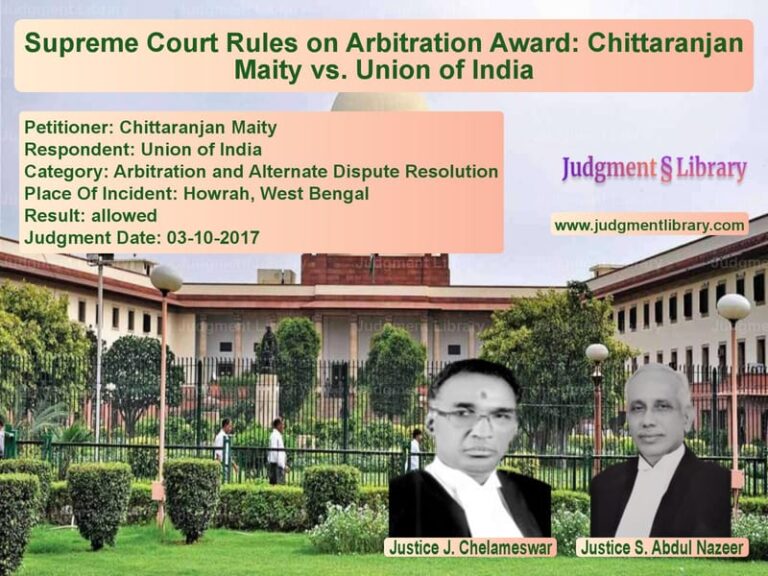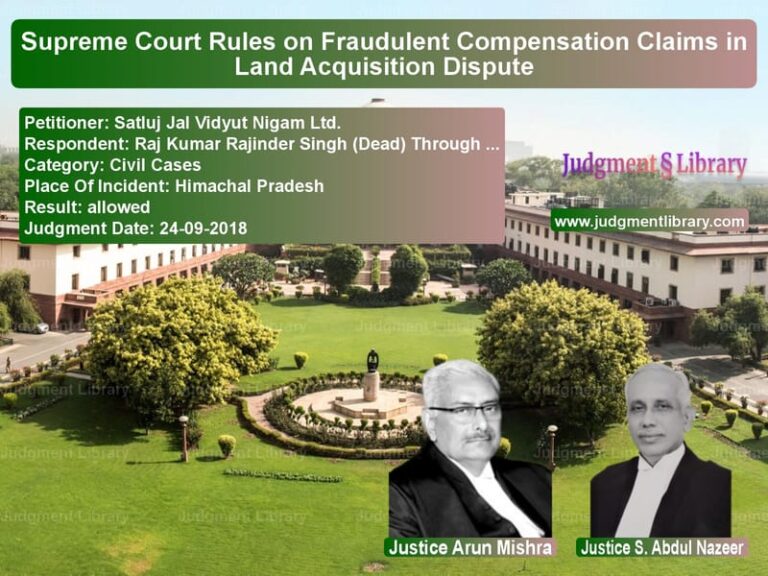Landmark Judgment on Kundli-Manesar-Palwal Expressway: Legal Battle Between Lender Banks and HSIIDC
The Supreme Court of India recently delivered a crucial judgment in the case of M.C. Mehta vs. Union of India, which involved disputes regarding the financing and execution of the Kundli-Manesar-Palwal (KMP) Expressway in Haryana. This judgment significantly impacted lender banks, government agencies, and infrastructure project execution.
The case originated from a series of interlocutory applications filed by a consortium of banks, including IDBI Bank and State Bank of India, seeking protection of their financial interests in the KMP Expressway project. The primary issue revolved around outstanding loans of approximately Rs. 1419.15 crores, which were at risk due to changes in the concessionaire responsible for the project.
Background of the Case
The Haryana State Industrial and Infrastructure Development Corporation Limited (HSIIDC) awarded the development of the 135.65 km long KMP Expressway to a Special Purpose Vehicle (SPV) named ‘KMP Expressways Limited’. The concessionaire raised loans from a consortium of banks, including IDBI Bank and State Bank of India, under a loan agreement executed on January 8, 2007.
Due to project delays, the Supreme Court appointed the Environmental Protection Control Authority (EPCA) to monitor and expedite its completion. Despite multiple agreements and negotiations, HSIIDC revoked a previously agreed termination payment of Rs. 1300 crores, which was meant to be utilized towards repaying the lender banks.
Petitioner’s Arguments
The learned Attorney General, Mr. Mukul Rohtagi, representing the banks, submitted:
- HSIIDC ignored repeated requests from lender banks to act in terms of the substitution agreement.
- The appointment of a new concessionaire was carried out without considering the banks’ rights and without ensuring the repayment of outstanding loans.
- HSIIDC violated contractual obligations by failing to include provisions protecting lender banks in the new concession agreement.
Respondent’s Arguments
HSIIDC contended:
- The decision to replace the existing concessionaire was taken to expedite project completion.
- The selection of the new concessionaire followed due process and legal guidelines.
- The termination payment agreement was revoked based on internal government decisions.
Supreme Court’s Decision
The Court, presided by Chief Justice T.S. Thakur and Justice R. Banumathi, observed:
“Any dispute, difference, or claim arising out of or in connection with or in relation to this Agreement shall be referred to arbitration in accordance with the Rules of Arbitration of the Indian Council of Arbitration.”
Key Directions by the Court
- All disputes between the lender banks, HSIIDC, and the outgoing concessionaire were referred to arbitration.
- 80% of the toll collected from the Manesar-Palwal section was to be deposited in an escrow account managed by IDBI Bank.
- HSIIDC was required to measure the completed work before allowing the new concessionaire, ESSEL, to commence operations.
Legal Interpretation of the Judgment
The judgment establishes that while infrastructure projects require smooth execution, financial institutions that invest in such projects must have their interests protected. The decision to refer the dispute to arbitration aligns with contractual obligations, but it also raises concerns about the future stability of lender-bank agreements in similar projects.
By holding that lenders’ rights should be considered when appointing new concessionaires, the judgment emphasizes financial accountability and due diligence in public-private partnerships. The direction to deposit 80% of toll collections into an escrow account provides a temporary safeguard for lenders, but the long-term implications depend on arbitration outcomes.
Impact of the Judgment
This ruling reinforced the legal framework governing large-scale infrastructure projects and emphasized the need for protecting lender banks’ rights. The judgment also underlined the importance of adhering to contractual obligations when replacing concessionaires in public-private partnership projects.
With the disputes now referred to arbitration, the financial interests of lender banks are safeguarded, setting a precedent for future infrastructure financing disputes. The ruling also acts as a cautionary tale for government agencies handling public-private partnerships, stressing the necessity of honoring financial commitments.
Conclusion
The Supreme Court’s ruling in this case highlights a critical aspect of infrastructure financing – ensuring that financial institutions and lenders have adequate safeguards when large-scale projects undergo administrative and operational changes. This decision sets a precedent for similar cases where government agencies and financial institutions must navigate contractual obligations while ensuring project continuity.
Ultimately, the outcome of arbitration will determine the final resolution of this case, but the Supreme Court’s directives have already made a significant impact by reinforcing financial accountability in infrastructure projects.
Don’t miss out on the full details! Download the complete judgment in PDF format below and gain valuable insights instantly!
Download Judgment: M.C. Mehta vs Union of India & Ors Supreme Court of India Judgment Dated 13-05-2016-1741860851988.pdf
Direct Downlaod Judgment: Direct downlaod this Judgment
See all petitions in Contract Disputes
See all petitions in Property Disputes
See all petitions in Judgment by T.S. Thakur
See all petitions in Judgment by R. Banumathi
See all petitions in partially allowed
See all petitions in Remanded
See all petitions in supreme court of India judgments May 2016
See all petitions in 2016 judgments
See all posts in Civil Cases Category
See all allowed petitions in Civil Cases Category
See all Dismissed petitions in Civil Cases Category
See all partially allowed petitions in Civil Cases Category







